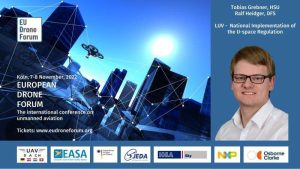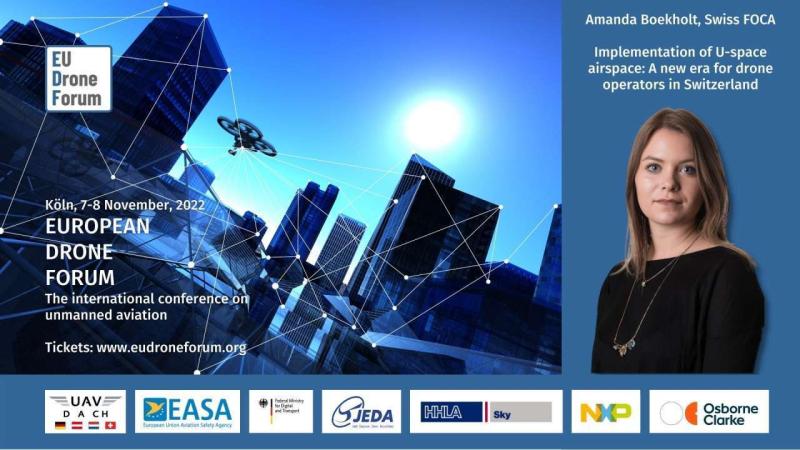The European Drone Forum is holding its fifth annual international conference on unmanned aviation on 7-8 November in Cologne, Germany. The event is held in cooperation with the European Aviation Safety Agency (EASA) and the German Federal Ministry of Digital and Infrastructure.
The first day will feature industry feedback on how the Delegated Regulation (EU) 2019/947 has been implemented in Europe. Operators and experts will report on challenges in applying for an authorization and operating unmanned aircraft systems (UAS) under these conditions. A panel discussion will give the audience an opportunity to interact with the speakers and share knowledge and ideas for addressing the challenges.
EASA announced it will provide insights into the upcoming version of the Specific Operational Risk Assessment (SORA) 2.5 and how the professional unmanned aviation field will evolve. From the industry, benchmark technologies for extending the range of drones and operating multiple drones from a remote control centre will be on stage.
The second day will focus on the implementation of airspace and drone services. Research results from universities will be reported on how U-space can be used in the future and how public acceptance can be achieved.
Among presentations, the experiences of an ongoing U-space concept of NAA Switzerland – FOCA will be provided.
Additionally, Tobias Grebner HSU and Ralf Heidger, DFS, will speaking on the topic of Germany’s project Lösungen und Handlungsempfehlungen für die nationale Umsetzung der U-Space-Verordnung (LUV), translated as solutions and recommendations for action for the national implementation of the U-Space Regulation. The objective of LUV is to develop recommendations for action for the national implementation of the U-space regulation (DVO (EU) 2021/664), taking into account technical, legal and organisational contexts. Within this framework, cornerstones for necessary adaptations in German air law are to be developed and further recommendations for action are to be made, among other things, for the design of roles, responsibilities and requirements for the technical equipment of air traffic participants.
To achieve the project objectives, a U-space operational concept will first be developed, which envisages that one Single Common Information Service Provider (SCISP) and several U-space Service Providers (USSP) will operate in the U-space airspace. The SCISP provides the USSPs with all relevant airspace data for the provision of U-space services. The USSPs in turn provide the services defined for a U-space (U-space services).
LUV is funded by the German Federal Ministry of Digital Affairs and Transport (BMDV) for 15 months.
Finally, the concepts how to include drones in an urban environment with micro airports, the first test results of bringing AirTaxis in the airspace from Korea, and the concept of France, how to limit the risk of mid air collision close the #EDF22.
The programme will be surrounded with a small expo area and lots of time to discuss and exchange knowledge. Beside the drone team of EASA, over 40 representatives of the national authorities have registers with UAV DACH, that expects 150 participants. For all who cannot attend, a online stream will be available.

The programme can be accessed here
For more information visit:




